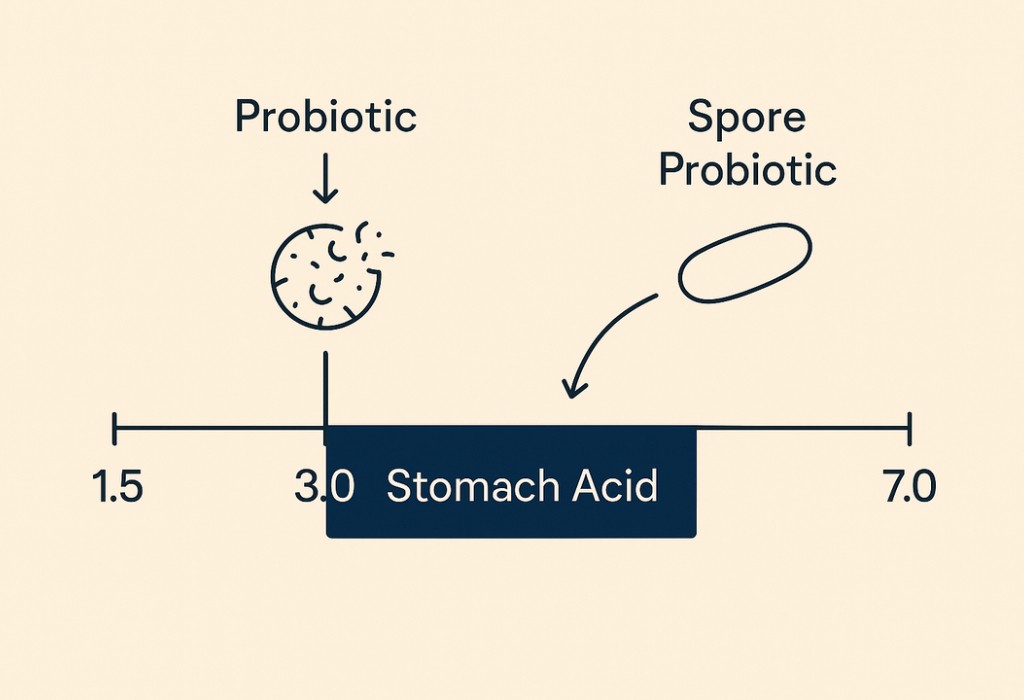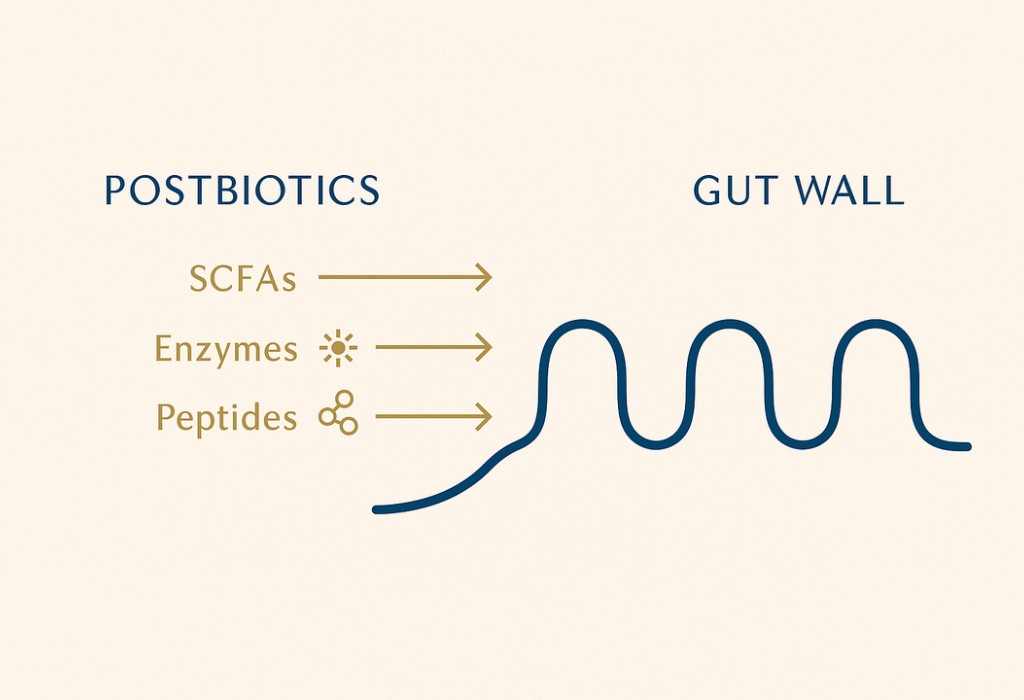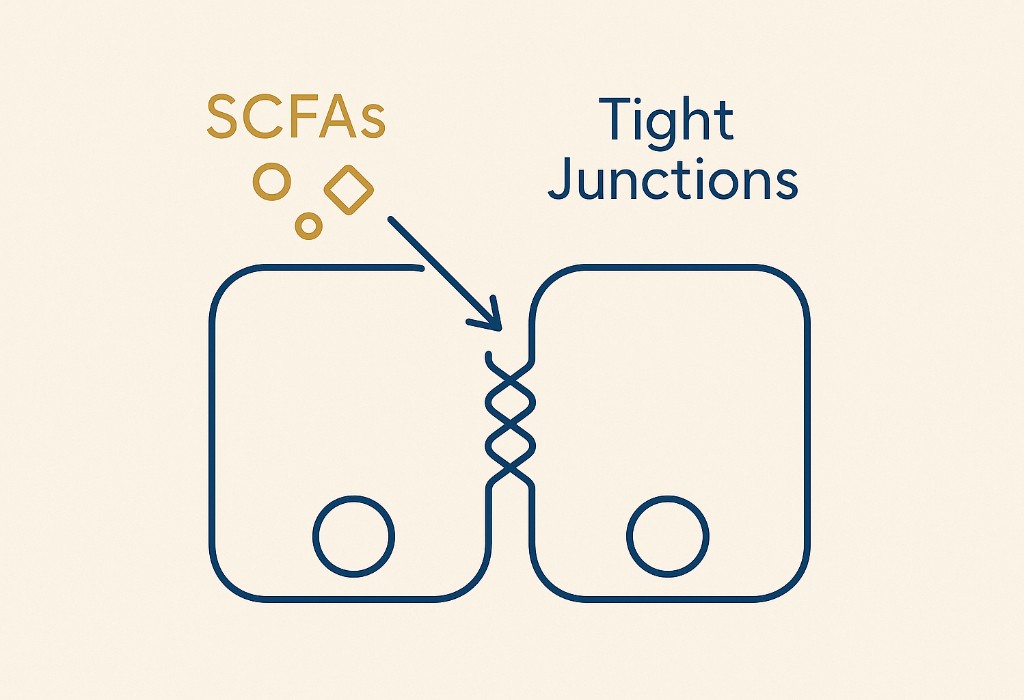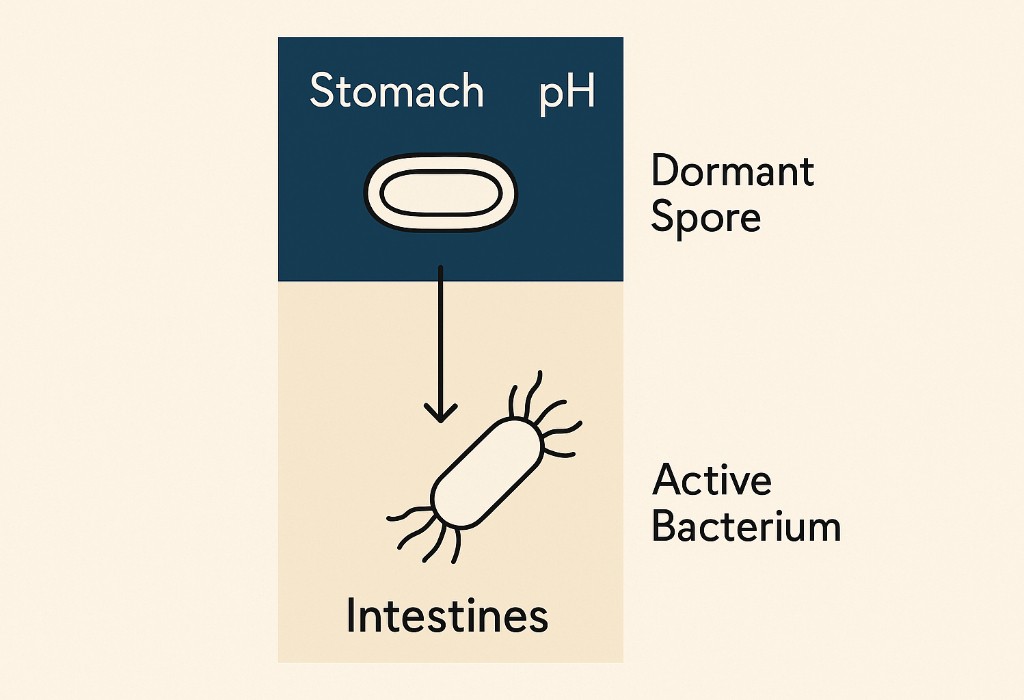Solving the Gut Health Puzzle – Why Probiotics Often Fall Short
The gut, a complex and profound inner ecosystem, is home to trillions of microorganisms that profoundly influence everything from digestion and immunity to mood and metabolic balance. While probiotics have long been championed as a solution for gut health, their effectiveness is frequently compromised by the treacherous journey through the digestive system. Stomach acid, bile, and digestive enzymes often destroy many traditional probiotic strains before they can even reach their destination. This challenge has led science to explore more resilient and effective avenues: spore probiotics, nourishing prebiotics, and the emerging power of postbiotics. Together, these offer a comprehensive, science-backed approach to cultivating optimal gut health that extends beyond the limitations of conventional probiotics.
The Science of Survival: Why Most Probiotic Strains Fail in the Digestive System
The Digestive Gauntlet: Stomach Acid and Bile
The journey through the human digestive system presents a formidable challenge for many traditional probiotic strains. Designed to break down food, the stomach’s highly acidic environment (with a pH as low as 1.5) and the presence of bile can destroy delicate microorganisms before they ever reach the intestines. Probiotics must also survive passage through the small intestine, which presents additional challenges.
Most commercial probiotics, often containing strains like Lactobacillus and Bifidobacterium, are particularly susceptible to this harsh journey. Studies indicate that a significant percentage of these beneficial strains—up to 96%—may be destroyed by stomach acid, compromising their intended efficacy. [Corcoran, M. C., et al. (2011)]

Resilient Strains: Nature’s Survivors
However, some probiotic strains possess inherent resilience, having evolved mechanisms to withstand these extreme conditions. Notably, certain Bacillus strains, such as Bacillus coagulans, form protective spores. These dormant, highly resistant states allow the bacteria to survive stomach acid and bile, ensuring a greater number of viable cells reach the intestines where they can become active and colonize the gut, establishing a beneficial presence. [Cutting, S. M., 2011]
Postbiotics: A More Reliable Solution for Gut Health
Unlike live probiotics, postbiotics are the beneficial bioactive compounds produced by microorganisms during fermentation. Because they are not live organisms, postbiotics bypass the survival challenges posed by stomach acid and digestive enzymes, offering a more reliable and consistent delivery of their benefits directly to the gut.
These powerful compounds include a diverse range of substances such as:
Short-Chain Fatty Acids (SCFAs)
Key SCFAs like butyrate, propionate, and acetate provide essential energy to colon cells, maintain gut barrier integrity, and exhibit potent anti-inflammatory effects by modulating cytokine production, the “alarm bells” responsible for signaling the start of an inflammatory response in your body.
Butyrate, in particular, is crucial for gut barrier support and has been studied for its role in alleviating gastrointestinal conditions like IBS and Crohn’s disease, as well as enhancing gut microbiome health.
They also contribute to a healthy gut pH, favoring beneficial bacteria. You can read more about butyrate benefits, production and supplements in (Butyrate Benefits: Its Role in Gut and Overall Health)
Enzymes and Peptides
These compounds accelerate biochemical reactions, aiding in nutrient absorption, and can possess antimicrobial properties, further supporting a balanced gut environment.
Postbiotics work synergistically to support optimal gut function and overall well-being, representing a stable and effective approach to nurturing your inner ecosystem.

The Mechanism of Postbiotics: Consistent & Comprehensive Support
The inherent stability of postbiotics ensures their consistent delivery of benefits directly to the gut, bypassing the survival issues of live bacteria. Their key mechanisms include:
Immune Regulation:
Postbiotics play a crucial role in maintaining immune balance. They gently modulate cellular communication, helping to regulate inflammatory responses and reduce chronic inflammation. For instance, postbiotics influence pro-inflammatory cytokines like TNF, a protein messenger released by immune cells that can signal inflammation. Postbiotics help ensure these signals remain balanced, not overactive. [McFarlin, B. K., et al., 2017]
Gut Barrier Enhancement:
Specific postbiotics, such as butyrate, actively promote the production of tight junction proteins. These structures are vital for maintaining a robust gut barrier, preventing increased intestinal permeability (often referred to as ‘leaky gut’). Butyrate also supports overall intestinal function, contributing to efficient digestion and nutrient absorption.
Antioxidant Protection
Some postbiotics neutralize free radicals (unstable molecules that can damage cells), thereby protecting intestinal tissues from oxidative stress.
Prebiotics: Naturally Nourishing Your Inner Garden
Prebiotics are non-digestible food components that selectively stimulate the growth and activity of beneficial gut bacteria already present in your microbiome. Found naturally in foods like garlic, onions, bananas, and whole grains, they serve as vital nourishment for your gut’s beneficial inhabitants. Diets rich in these foods can significantly influence gut health by providing the necessary fuel for beneficial bacteria.
When fermented by gut bacteria, prebiotics lead to the production of beneficial Short-Chain Fatty Acids (SCFAs), including butyrate. This process not only contributes to numerous health benefits but also actively enhances microbiome balance by promoting the growth of key beneficial bacteria like Bifidobacterium and Lactobacillus.
A balanced microbiome, in turn, enhances digestion, supports nutrient absorption, and contributes to a well-regulated immune system, ultimately reducing systemic inflammation.

Spore Biotics (Spore-Forming Probiotics): A Resilient Alternative
Spore probiotics (also known as spore-forming probiotics) represent a resilient alternative to traditional probiotic strains. These specialized bacteria form durable spores, allowing them to withstand extreme conditions such as stomach acid, bile salts, and high temperatures. Remaining dormant during their journey, these spores activate only upon reaching the more favorable environment of the intestines, where they become active and colonize the large intestine to exert their beneficial effects. [Hong, H. A., et al. 2005].
This unique spore-forming capability ensures a significantly higher survival rate, allowing a greater number of beneficial bacteria to reach their intended destination. Once active, these strains (such as various Bacillus species) contribute to a balanced gut flora, modulate immune responses, and produce enzymes that support nutrient absorption and overall digestive stability. They offer a more reliable way to deliver beneficial bacteria, overcoming the survival challenges faced by non-spore forming strains. Spore biotics are available as a probiotic supplement [Cutting, S. M., 2011]

Collagen and L-Glutamine: Supporting Gut Barrier Repair
Beyond their well-known roles in skin and joint health, collagen and L-glutamine offer foundational support for the gut barrier, a critical component of overall digestive health. Increased intestinal permeability, often referred to as “leaky gut syndrome”, can compromise gut barrier integrity. Supporting the gut barrier with nutrients like collagen may help address the root causes of this condition. While these initial findings are promising, it’s important to note that further research is needed to fully understand the mechanisms and extent of collagen’s prebiotic-like effects. For a transparent look at the evidence, see our article(Do Collagen Supplements Really Work? A Transparent Look at the Evidence)
Synergistic Action for Gut Barrier Integrity
Beyond their well-known roles in skin and joint health, collagen and L-glutamine offer foundational support for the gut barrier, a critical component of overall digestive health.
- Collagen: Rich in amino acids like proline, glycine, and hydroxyproline, collagen provides essential building blocks that help repair and regenerate the intestinal lining, directly supporting gut barrier integrity. [Chen, Q., et al., 2017]
- L-Glutamine: As the preferred energy source for the cells lining the gut (enterocytes), L-glutamine is vital. It enhances the synthesis of tight junction proteins, which are crucial for sealing the gut barrier. While ‘leaky gut’ is a commonly used term, in scientific terms, this refers to increased intestinal permeability—a condition where the gut lining becomes more permeable, allowing substances that should remain within the gut to pass into the bloodstream. L-glutamine helps to strengthen this barrier, supporting its integrity and reducing this increased permeability. [ Shu. X, et al.,2016]
This synergistic combination provides both the structural components and the cellular energy necessary for robust gut barrier repair and maintenance, reducing systemic inflammation and enhancing overall digestive function.
You can read more about Gut Health is the foundation of wellbeing in (The Architects of Gut Health: How SCFAs Build Your Foundation for Wellness)
Foods that Support Gut Health
The foods you eat play a powerful role in shaping your gut health and the diversity of your gut microbiome. Incorporating a variety of fermented foods—like yogurt, kefir, kimchi, and sauerkraut—can introduce beneficial bacteria directly into your digestive system, supporting the growth of helpful gut microbes. These foods are natural sources of probiotics that can help maintain a healthy balance of bacteria and promote digestive health.
Equally important are foods high in dietary fiber, such as fruits, vegetables, legumes, and whole grains. Dietary fiber acts as a prebiotic, feeding the beneficial bacteria in your gut and encouraging their growth. This, in turn, helps reduce inflammation and supports a healthy gut barrier.
Don’t overlook the benefits of omega-3 fatty acids, found in foods like salmon, walnuts, and flaxseeds. These healthy fats can help lower inflammation and support the overall health of your gut. Additionally, polyphenol-rich foods—such as berries, green tea, and dark chocolate—have been shown to promote the growth of beneficial bacteria and protect against oxidative stress.
Ultimately, a varied diet that includes a wide range of whole, nutrient-dense foods is key to supporting gut health, fostering microbial diversity, and promoting the growth of beneficial bacteria for a balanced gut microbiome.
Potential Risks and Side Effects
While probiotics and prebiotics offer many health benefits, it’s important to be aware of potential risks and side effects. Some individuals may experience mild digestive symptoms, such as bloating, gas, or abdominal discomfort, especially when first introducing probiotics or prebiotics into their routine. These effects are often temporary, but can be more pronounced in people with underlying health conditions like irritable bowel syndrome (IBS).
Certain probiotic supplements may not be suitable for everyone. Individuals with compromised immune systems—such as those undergoing chemotherapy or living with HIV/AIDS—should exercise caution, as introducing new bacteria could pose health risks. Additionally, the quality and safety of probiotic and prebiotic products can vary significantly between brands and formulations.
To ensure you’re making the best choices for your health, it’s always wise to consult with a healthcare professional before starting any new supplements, especially if you have a medical condition or are taking other medications. This guidance can help you avoid unwanted side effects and select the most effective products for your needs.
The Role of Gut Health in Overall Well-being
Gut health is deeply intertwined with your overall well-being. An imbalanced gut microbiome has been linked to a wide range of health concerns, including metabolic diseases like obesity and diabetes, as well as mental health conditions such as anxiety and depression. The gut-brain axis—a complex communication network between your gut and your brain—plays a crucial role in regulating mood, cognitive function, and emotional health.
Your gut microbiome also has a significant impact on your immune system. When the balance of gut bacteria is disrupted, it can lead to increased inflammation and oxidative stress, both of which are associated with chronic disease. Maintaining a healthy gut through a balanced diet, stress management, and targeted supplements like spore-based probiotics can help support immune function, reduce inflammation, and promote resilience against metabolic and mental health challenges.
By prioritizing gut health, you’re not just supporting your digestive system—you’re investing in your body’s ability to maintain energy levels, regulate mood, and protect against chronic disease.

FAQs
Probiotics are live microorganisms intended to benefit gut health. Prebiotics are non-digestible fibers that feed beneficial gut bacteria. Postbiotics are the beneficial compounds produced by bacteria during fermentation (they are not alive).
Spore probiotics are generally more resilient and more likely to survive the harsh conditions of the stomach, making them a potentially more effective option for delivering live bacteria to the intestines.
Yes, prebiotics and postbiotics can work synergistically. Prebiotics provide the fuel for beneficial bacteria, which then produce postbiotics.
Individual results vary, but some people may notice improvements in digestion and overall well-being within a few weeks. Consistent use is key for long-term benefits. It’s always best to consult a healthcare professional for personalized advice.
Hormone Regulation
The gut microbiome houses a special collection of bacteria called the estrobolome. This group of microorganisms is responsible for metabolizing and regulating estrogen. As a woman’s natural estrogen production declines during menopause, a healthy and balanced estrobolome can help manage the remaining estrogen levels, potentially mitigating common symptoms like hot flashes, night sweats, and mood swings. Conversely, an imbalanced gut can interfere with this process, leading to more pronounced symptoms.
Metabolism and Weight Management
Menopause is often associated with a shift in metabolism and an increase in body fat, especially around the abdomen. The gut microbiome influences how your body processes food and stores energy. A diverse and healthy gut can enhance insulin sensitivity and support a more efficient metabolism. An unhealthy gut, known as dysbiosis, can contribute to weight gain and a higher risk of developing metabolic conditions.
Mood and Mental Health
The gut-brain axis is a two-way communication system connecting your gut and your brain. Gut bacteria produce neurotransmitters, such as serotonin, which are crucial for regulating mood and emotional well-being. Given that hormonal fluctuations during menopause can already impact mental health, a healthy gut microbiome can help stabilize these neurotransmitter levels, potentially reducing feelings of anxiety, irritability, and depression.
Bone Health
The drop in estrogen during menopause increases the risk of osteoporosis. Research indicates that the gut microbiome can influence bone mineral density by affecting the absorption of critical nutrients like calcium and vitamin D. A well-functioning gut can optimize nutrient uptake, helping to support stronger bones and lower the risk of fractures.



